A month ago, Georg Thalhammer and his team from Steinfeld got their eighth Biofach Award in a row with their seaweed wild garlic pesto. People could almost forget that the committed retailer is still dealing with the distribution of raw materials in addition to his innovative range of specialties. At the moment we are in the middle of the season for imported pumpkins. Meanwhile, this year's campaign for fresh wild garlic is also ready to start. A conversation about innovation, growth opportunities and imports from afar. 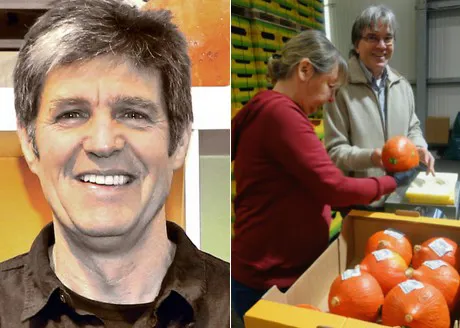
The company's diversified import business currently includes two growing projects in Egypt, as well as partners in Argentina and South Africa. "Domestic goods are usually available until the end of the year, after which we buy goods from the Netherlands for about a month before the import season starts. At the end of June-beginning of July, the first local organic pumpkins will be harvested again," Thalhammer says about the usual development of the season.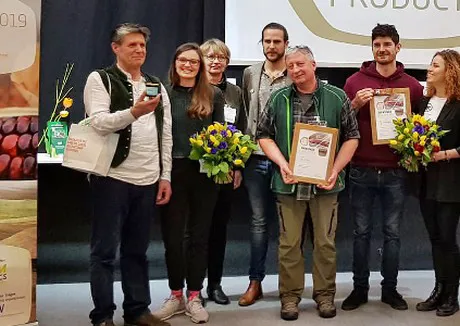 Georg Thalhammer (l) at the award ceremony of this year's BioFach
Georg Thalhammer (l) at the award ceremony of this year's BioFach
Cultivation projects in three countries
At the moment, the expert is in a transitional phase: the Egyptian product is only on the market for a short while, but this week the first Argentinean pumpkins will arrive. "It's mainly Hokkaido pumpkins that we sell; this variety is by far the most popular in Germany. These import gourds will partly end up on the shelves of the larger LEH chains as well."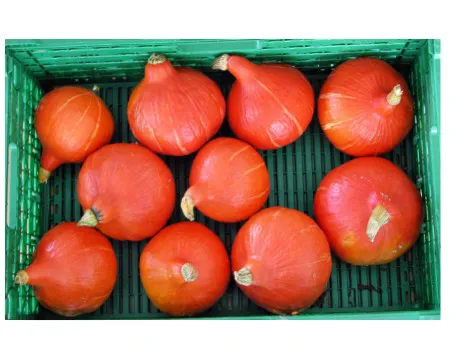
Fresh Hokkaido pumpkins
The first cultivation project in Egypt was started 10 years ago; in 2018 a second project was added. The foreign pumpkin plants also underwent a lot of variety trials in recent years, some being quite succesful, says Thalhammer. "At the moment we are receiving the Sunshine variety from Egyptian fields every week. In terms of taste, this variety resembles a sweet chestnut." However, Egypt is not the ideal growing country, certainly not in the period when Germany needs imported goods, Thalhammer admits. "It's too high on the equator, so there are quite a few cool nights in November and December. As a result, the growth of pumpkins is effectively inhibited and so we don't have the same yields as in Germany. "
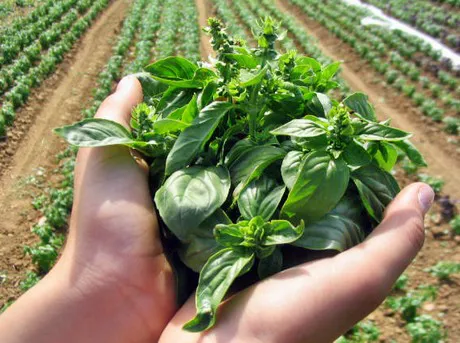 Home-grown basil is also marketed to wholesalers
Home-grown basil is also marketed to wholesalers
The pumpkin as a year-round product
During the domestic season, Thalhammer sources pumpkins from 15 organic farms in Germany. The core activity of the company the marketing of raw materials as well as the processing of the vegetables. At the moment, specialties such as pumpkin ketchup are also increasingly being found on the shelves of large supermarket chains.
The consumption of pumpkins had been satisfactory until the beginning of March, but at the moment the demand - parallel to the growing supply of local vegetables - is slowly declining. "The price of current imported goods is twice that of domestic products during the season. Nonetheless, the pumpkin is becoming more and more of a year-round product. Our next step will be the cultivation of Demeter pumpkins abroad, but that would be more likely be centered on Argentina or South Africa."
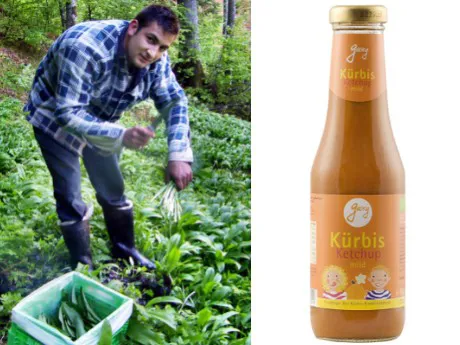 Left: Bear's garlic harvest in the beech forest, Right: The pumpkin ketchup, a proven specialty in the existing range.
Left: Bear's garlic harvest in the beech forest, Right: The pumpkin ketchup, a proven specialty in the existing range.
Start of the wild garlic campaign
At the same time as the Egyptian pumpkin campaign, the season for fresh wild garlic is also ready to start. For about two weeks, this produce is already being harvested in the Rheingraben. At the end of the season it is also coming from the higher-lying deciduous forests in the Alps. "We supply the food retailers with pre-packaged raw materials. In addition, some of them go to butchers and bakeries as raw canned goods. The remainder is processed into pesto and other products, in our production facility. "Seaweed-wild garlic pesto was given an award at this year's Biofach. Furthermore, there are five new, innovative flavors. "At the beginning of April, we will present our specialties to the consumers, via tastings in Bio Company's Berlin pop-up store."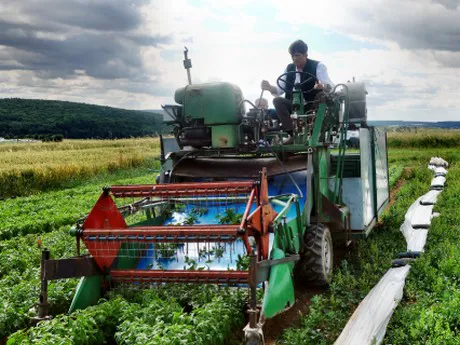
Georg Thalhammer on the harvester
For more information:
Georg Thalhammer
Gesundes von Feld und Wald
Handel mit Biolebensmittel e.K.
Tannenweg 10
D-97854 Steinfeld
Tel.: 0049 9359 9090376
Fax: 0049 9359 9090415
E-Mail: georg@georgthalhammer.com
www.georg-thalhammer.de
www.biofeinkost-onlineshop.de
